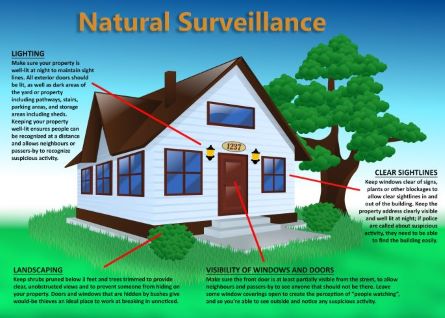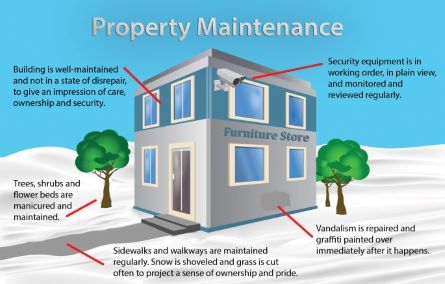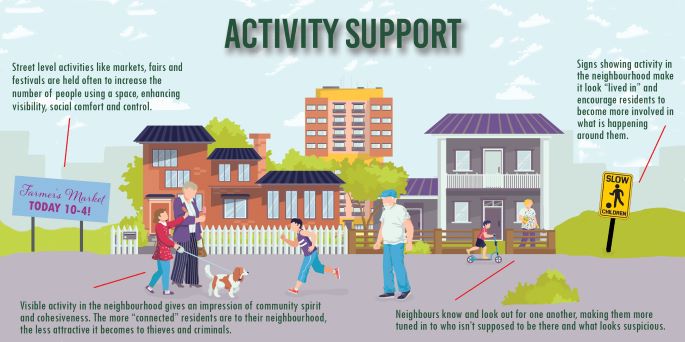Crime Prevention Through Environmental Design (CPTED)
Crime Prevention Through Environmental Design (CPTED) is being used worldwide. It enhances safety by influencing the physical design of our environment and encouraging positive social interaction. CPTED recognizes that our environment directly affects our behaviour, because we constantly respond to what is around us. These responses help us to interact safely in our communities.
How does CPTED work?
An environment designed using CPTED principles reduces opportunities for criminal acts to take place and helps us to feel safer. By doing so, it improves our quality of life. CPTED uses strategies that work together to create safer communities. It complements crime prevention strategies such as locks and bars, police and security personnel.
- A well-maintained home, building or community park creates a sense of guardianship and that helps deter criminals.
- Community activity is important. Criminal acts can be discouraged in public spaces when we encourage activities in those spaces by residents, visitors and other legitimate users.
- Natural access control guides help people enter and have a space through the placement of entrances, exits, fences, landscaping and lighting. It can decrease opportunities for criminal activity by denying criminals access to potential targets and creating a perception of risk for would-be offender.
In an ideal world, CPTED concepts would begin at the beginning - during development, but that's not always possible, especially in existing communities. From home owners and tenants to businesses and communities, there are a number of ways to implement CPTED initiatives.
Making homes safer

- Clearly define where your property begins and ends using plants, fences, changes in grade or different walkway colour
- Provide unobstructed views of entrances and windows by trimming shrubs and trees - see and be seen
- Install motion-sensor lights outside, especially to exterior doors and dark areas of your yard, including sheds
- Use quality locks on doors and windows
- Have locking gates between front and backyards
- Make sure to maintain your landscaping
Final note: a well-cared for yard and house gives off a sense of pride and territorial feel. Potential offenders are more likely to feel there's a strong possibility they will be caught, if they enter a well-maintained property. Many of these same principles apply to apartment and condo dwellers. If you have a balcony, make it part of your living space with plants and seating - and practice the principle of see and be seen by enjoying some time out on your balcony or patio.
Make businesses safer

Keep your exterior in good repair: remove or paint over graffiti immediately, repair and paint any signs of wear or vandalism as soon as possible. Other recommendations include:
- Maintain sidewalks by removing snow, ice and debris
- Clearly define the entry to your business
- Keep rear exit/loading area clear and clean
- Keep your windows clear of posters and signage - see and be seen
- Add strong lighting and outside surveillance cameras to both front and rear entryways
- Use well-placed signage and interior mirrors to notify others your business uses both interior and exterior surveillance security methods
Final note: like your home, your business should show your pride in ownership. By maintaining it properly and showcasing that you have excellent security measures in place, offenders are less likely to attempt any unwanted behaviour.
Make neighbourhoods safer
Like homes and businesses, the biggest deterrent to crime in neighbourhoods is a well-loved, well-used neighbourhood. Some key elements to creating a safe neighbourhood include:
- Appropriate lighting for streets, paths, alleys and parks
- Maximize sightlines in and out of public spaces like parks and paths
- Encourage use of public spaces through community events and block parties
- Record, report and remove graffiti immediately
As an individual, the best thing to do is to get to know your neighbours. Make a habit of walking through your neighbourhood, stop and chat with neighbours and get to know the rhythms of the community. If it's feasible to walk to the local shopping areas, do so. This is another opportunity to become aware of your community and interact with those you meet. It doesn't take much to know who lives in the area and to get a feel for your community, and to become part of it. Once you know your community, you'll recognize questionable activity or something that doesn't fit immediately. When you do, report it right away.

Once you've gotten to know your neighbours, getting together to put on a block party or community event becomes easy. When neighbours use and are seen using their neighbourhood as a whole social place, a sense of pride and ownership develops.
Final note: When communities come together like this, bad characters stay away - because your neighbourhood has become a community that's active and where neighbours look out for one another. It's become a safe neighbourhood.
To learn more about Crime Prevention Through Environmental Design, visit CPTED Canada
Book a Block Party
If you would like to organize a block party in your neighbourhood, CLICK HERE to see how the Cold Lake and District FCSS can help you. From applications to posters and equipment, you'll find everything you need to throw a spectacular party and bring your neighbourhood together for some community fun.
Report Graffiti
Dealing with graffiti as soon as you see it is a key step in keeping your community and neighbourhood safe. A well-maintained business district and neighbourhood indicates a well-cared-for community - a place that deters criminal activity. To report graffiti, CLICK HERE.
Contact Us
City of Cold Lake
5513 - 48 Avenue, Cold Lake, Alberta, T9M 1A1
T. 780-594-4494
F. 780-594-3480
Sign up to our Newsletter
Stay up to date on the city's activities, events, programs and operations by subscribing to our eNewsletters.